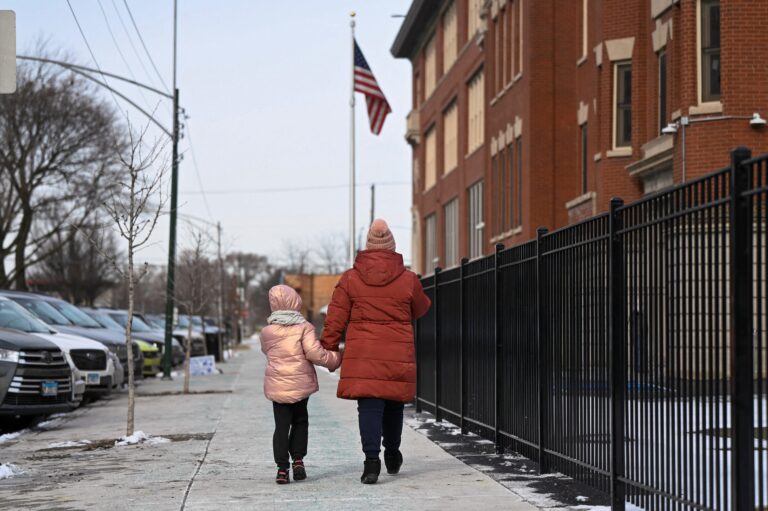Chicago Elementary School Staff Refuse Federal Agents Access, Sparking Official Reactions
Recently, staff members at a Chicago elementary school declined entry to federal agents who arrived without prior notice. This event has ignited discussions amid ongoing debates about immigration enforcement and the safety of school environments. School administrators explained that their personnel followed district guidelines aimed at safeguarding student privacy and ensuring that any involvement of law enforcement is communicated clearly and authorized.The absence of advance warning about the agents’ visit contributed to the staff’s cautious approach.
The refusal to grant access has elicited prompt responses from city officials and federal representatives,highlighting differing perspectives:
- Federal authorities: maintain that their visit was part of routine safety checks and procedural assessments.
- School district: stresses its dedication to protecting students and following legal protocols before permitting law enforcement entry.
- Community members: express mixed reactions, with some applauding the protective stance of school staff, while others urge clearer collaboration between agencies.
| Role | Title | Summary of Statement |
|---|---|---|
| School Administrator | Principal | Highlighted the importance of upholding student rights and district policies. |
| Federal Official | Lead Investigator | Clarified that the visit was procedural, not investigative in nature. |
| Municipal Representative | Safety Coordinator | Advocated for enhanced communication between schools and federal agencies. |
Debate Over Federal Involvement in Public School Operations Intensifies
Following the incident, educators and community leaders in Chicago have raised serious concerns about the extent of federal authority within local public schools. The refusal to allow federal agents entry has sparked a wider conversation about the boundaries of federal intervention,especially regarding student privacy,school autonomy,and safety protocols. Many stakeholders argue that unannounced federal visits risk eroding trust and disrupting the educational atmosphere.
Additional worries focus on the protection of student data and rights. Critics emphasize the need for transparent collaboration between federal agencies and school administrations to ensure that any federal involvement respects existing policies and community values. The table below outlines the primary concerns voiced by Chicago school officials:
| Issue | Description |
|---|---|
| Student Confidentiality | Safeguarding sensitive student facts from unauthorized access or misuse. |
| Local Control | Preserving the authority of local entities over school management and decisions. |
| Safety Procedures | Ensuring federal presence aligns with established school safety measures. |
| Community Confidence | Promoting open dialog and cooperation among all stakeholders. |
- Effective communication channels are essential to avoid misunderstandings.
- Compliance with legal frameworks is mandatory when involving external agencies.
- Community engagement should guide any federal involvement in schools.
Balancing School Security and Student Privacy: Key Considerations
The recent refusal by Chicago elementary school staff to admit federal agents highlights the complex challenge of balancing campus security with the protection of student privacy rights. Schools increasingly serve as points of contact for law enforcement, raising vital questions about clarity, jurisdiction, and the potential impact on the school climate. While ensuring safety is critical, it must not come at the expense of students’ personal information or create an environment of undue surveillance that could damage trust.
Experts recommend establishing clear guidelines that specify when and how external agencies may engage with school personnel and students. Important factors to consider include:
- Parental consent and notification before sharing sensitive student information.
- Restricting data access to prevent unnecessary breaches of confidentiality.
- Staff training to equip employees with skills to manage federal requests while protecting student rights.
- Collaborative frameworks involving educators, families, and law enforcement to foster mutual understanding.
These elements are vital to developing policies that uphold safety without compromising privacy, ensuring a secure yet respectful educational environment amid evolving legal complexities.
Guidelines for Law Enforcement Access in Schools: Best Practices
To effectively manage interactions between school staff and law enforcement, it is essential to implement clear, consistent, and transparent protocols. These procedures should define the conditions under which federal agents may enter school premises, prioritizing student safety and privacy. Developing these guidelines collaboratively-with input from legal experts, educators, parents, and civil rights organizations-can help resolve potential conflicts and empower staff to respond appropriately during law enforcement engagements.
Key elements that such protocols should encompass include:
- Verification processes: Confirming the identity and purpose of agents before granting access.
- Notification policies: Informing parents and school leadership promptly when federal agents are involved.
- Record-keeping: Documenting all encounters to ensure transparency and accountability.
- Training initiatives: Providing staff with education on students’ rights and law enforcement procedures.
| Protocol Component | Objective | Anticipated Result |
|---|---|---|
| Agent Verification | Authenticate identities | Prevent unauthorized access |
| Parental Notification | Promote transparency | Strengthen community trust |
| Encounter Documentation | Maintain detailed records | Enhance accountability |
| Staff Education | Inform on rights and procedures | Reduce confusion and liability |
Conclusion: Navigating the Intersection of Safety,Privacy,and Trust
The unfolding situation in Chicago,where elementary school personnel denied federal agents access,underscores the intricate challenges of balancing student safety,legal responsibilities,and community trust. The responses from school leaders and federal officials highlight the need for ongoing dialogue and policy advancement to address these issues effectively.As investigations proceed, all parties involved will be closely monitoring developments to ensure that the rights and well-being of students remain paramount while maintaining secure and cooperative school environments.





